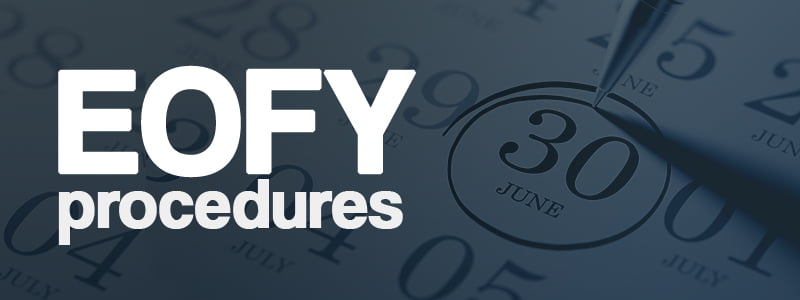The End of Financial Year – which occurs on 30th June for most companies – is an important date for enterprises for many reasons. In particular it is the time when the financial results for the financial year are finalised and formally presented to shareholders and stakeholders.
Completing financial year-end accounts
Some common accounting procedures to complete end of financial year accounts are set out below.
Bank reconciliations
All Bank reconciliations (including Credit Cards and Merchant accounts) need to be completed, with any unidentified differences resolved.
Year-end accruals
Accounting entries are required to recognise any expenses incurred but not yet paid, and not yet recognised in the accounts. Common examples of expense accruals include wages, utilities and services.
Accruals are also required to recognise revenues earned but not yet paid or recognised in the accounts.
Year-end prepayments
Prepayments arise when (usually) services are paid in advance but have not yet been delivered – examples can include rent, insurance and service contracts.
Accounting entries need to be recorded to recognise both accruals and prepayments at year-end. This is a complex area and the small business user will need help in this area. Checkout Zarmoney as user friendly accounting system that makes this easy.
Inventory
A full physical stocktake should be conducted at the end of the financial year, and any slow moving, obsolete or damaged inventory items being appropriately provided for or written off.
Debtors
Any “doubtful” or “bad” debts at year-end should be identified, and appropriately provided for. It should be noted that bad debts can only be claimed as a tax deduction when the debt is unrecoverable and has been fully written off, not merely provided for.
Loans receivable and payable
To ensure their accuracy, internal and external loan balances receivable and payable should be confirmed with the other party by an exchange of emails or correspondence.
Other year-end tasks
Statutory account preparation
Most Public companies and many Private companies are required to prepare full Statutory Accounts at the end of the financial year in accordance with Generally Accepted Accounting Principles (GAAP) and / or International Financial Reporting Standards (IFRS).
This will require specific accounting treatment for certain items (for example leases) and the preparation of comprehensive Notes to the Accounts.
Statutory obligations
All Public companies must hold an Annual General Meeting (AGM) within 5 months of the year-end at which the Annual Financial report, Directors’ report and Auditor’s report must be tabled. An Annual Audit must also be conducted.
An AGM and Annual Audit is not compulsory for Private companies although they are considered good practice.
Tax obligations
There are a number of annual filings (in addition to the Tax Return) which must be submitted to the Tax Office relating to Wages, Superannuation, Fringe Benefits and GST. Obligations vary depending on a company’s activities.
Tax return preparation
In Australia 30th June is also the end of the financial year for taxation purposes, so the annual Tax return (and supporting schedules) needs to be prepared (once the financial accounts for the year have been finalised).
Accounting system rollover and backup
Many accounting systems require that the accounts are “rolled over” at the end of the financial year.
The rollover process varies between systems, but generally entails “locking” the current financial year to prevent any further accounting entries being posted, and preparing a new set of Profit & Loss accounts with no balances (the Balance Sheet is of course carried across to the new financial year with Opening Balances).
Once the financial year accounts have been completed a full backup should be taken.
End of year financial processes and obligations are demanding and can be complex. If you need help with year-end processes reach out to the seasoned team at Fullstack whom can help with outsourced CFO services & tax planning.
Was this article helpful?
Related Posts
- The Netflix Tax: Does It Affect Your Business
The Goods and Services Tax affects digital products and services supplied to Australia — but…
- Tax Tips for Agencies for EOFY2020
Here are some essential EOFY tax tips for agencies. We have advice that will help…
- Cryptocurrency and GST
If you're into cryptocurrency, this guide will help you know how the Goods & Services…
- Crypto Lending: Helio
Selling cryptocurrency can add to your tax obligations. Crypto Lending provides crypto holders with the…

















